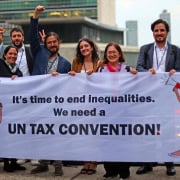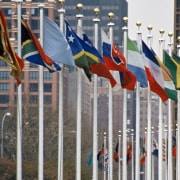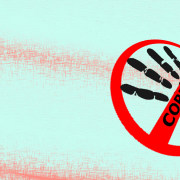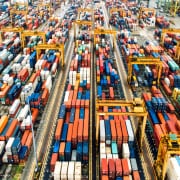|
Getting your Trinity Audio player ready...
|
At the beginning of April the Organisation for Economic Co-operation and Development (OECD) held the 10th edition of its annual global anti-corruption and integrity forum, in a virtual environment. The theme this year was Renew with Integrity, and the event focused on how creating different frameworks could resolve long-standing challenges, especially those exacerbated by the Covid-19 crisis, during which new opportunities for integrity violations and corruption emerged.
Speakers were drawn from numerous countries, and included South Africa’s public enterprises minister Patricia de Lille, Lebogang Modise of Microsoft, Prof Koleka Mlisana of the National Health Laboratory Service, and Sekoetlane Phamodi, country director of Accountability Lab in South Africa.
As leaders transition from uncertainty to establishing a renewed sense of global social purpose, and if we as a global society are to make good on our commitments on the 2030 Sustainable Development Goals, how can governments, business and civil society renew with integrity? This is the question that speakers at the first session, titled Strengthening Political Integrity, set out to address. The session also aimed to explore how to reach consensus on key standards of behaviour for elected and appointed public officials and how to best ensure their implementation and oversight.
“Expecting integrity is a gift we give to our political leaders”
Session moderator Elsa Pilichowski, the OECD’s director for public governance, said: “Public integrity means doing what is right for the economy and society. Political leaders are essential to public integrity by setting the tone at the top.”
But successfully doing so, she said, requires political leaders to have both political integrity – adherence to the highest standards of conduct in their behaviour – and also integrity in politics, that is committing to upholding the rules that champion the common good as agreed by the democratic system in place.
“Expecting integrity is in fact a great gift we can give to our political leaders.”
Unfortunately, this is not always the type of gift that political leaders appreciate. South Africa is not alone in its struggle with public officials of questionable integrity and unquestionable greed. However, decades of corruption, addressed with only the barest of effort, have brought the South African public’s trust in government down to embarrassingly low levels. This year’s Edelman Trust Barometer, now in its 22nd edition, shows that the South African government is the most distrusted of the four sectors reviewed annually in each index. It is also the second most distrusted government of all those under review – sadly, a distinct improvement on its recent performance.
Media, business and NGOs are the other three sectors, in increasing order of trust. In fact, the business and NGO sectors are far more trusted than media and government. Almost half of all respondents, said Edelman, viewed government and media as divisive forces in society.
Unwilling to work with govt, even in times of disaster
The deadly floods which battered KwaZulu-Natal in April prompted big-hearted South Africans to open their wallets, as they do when help is needed – but not to the government. Local NGO Gift of the Givers, which has a solid track record in effective disaster relief at home and overseas, was the favoured beneficiary of corporate and private donors, no doubt because they had no trust that in government hands, their money would get to where it was supposed to go.
To counter this understandable trend, governments should prioritise integrity in governance like never before.
“No country and no sector is immune to corruption,” said OECD secretary-general Mathias Cormann. “We need the accountability and oversight mechanisms of open, transparent and democratic societies to mitigate the risk or the constraints placed on the global economy by the Covid pandemic.”
Openness and transparency nurture a healthy democracy and should therefore be the foundation of any government that likes to call itself a democracy. “Fighting corruption is not only about detecting and sanctioning criminal cases … it is about strengthening public institutions to become more resilient to all types of corruption. It is about cultivating a culture of integrity across government and society as a whole,” Cormann said.
The commitment to public integrity starts at the political level, he added, but particularly in countries with high levels of political polarisation, it is not easy to reach consensus on, set and enforce integrity standards for public office holders.
Lack of integrity can kill the innocent
“Corruption is not a victimless crime,” stated Transparency International chairperson Delia Ferreira Rubio. “Corruption kills, corruption fuels war. Corruption undermines democracy. Corruption facilitates abuse of power, sustains autocracy. Corruption strengthens kleptocrats, and provokes humanitarian crisis.”
In South Africa we need look no further than the disaster that is the national Department of Health for evidence of such a humanitarian crisis fuelled by corruption. Long before the Covid-19 pandemic hit, hospitals and clinics were struggling with maladministration, theft of supplies, staff that did their own private work on official time, nepotism and unsuitable appointments, and more. Annual Auditor-General reports repeatedly showed the mismanagement of public money in that department, and it was not alone.
The Life Esidimeni scandal of the mid-2010s resulted in the deaths of 144 psychiatric patients at Life Esidimeni facilities in Gauteng. Causes included starvation and neglect. An ongoing judicial inquest is investigating the legal cause of each patient’s death, with a view to establishing criminal liability – but to date, more than half a decade later, not one official has been held accountable.
Covid’s arrival took the looting to new heights, as companies sprang up virtually overnight to join their greedy fellows in charging outrageous prices for protective equipment and supplies that had been, the week before, a fraction of the price they were now being sold for. If the equipment was not being sold for inflated prices, much of it was hoarded by those who had the resources to accumulate such stockpiles and as a result, medical staff were unable to adequately protect themselves from contracting the virus from the sick and dying who streamed into facilities that could not accommodate them all. Along with patients who suffered from a shortage of treatment supplies, nurses and doctors died unnecessarily.
The health department was itself disgraced by its very own minister at the time, Zweli Mkhize, who is presently one of the subjects of an investigation into corruption regarding two media campaigns for the department, one for the much-contested National Health Insurance, and one for the department’s Covid-related activities.
None of these facts are unknown. Accountability and responsibility, however, are as elusive as promises kept, while the people who want answers from their elected representatives are made to stand and watch the chaos. And the health department is just one example. So where do we even begin to address this problem?
Look out for part 2 of this mini-series, in which the OECD guest speakers make some practical suggestions, based on their experiences.








